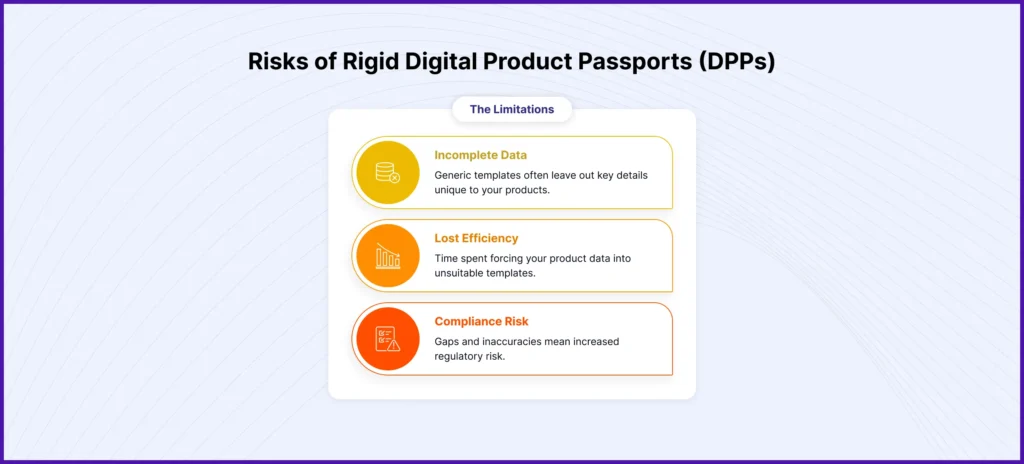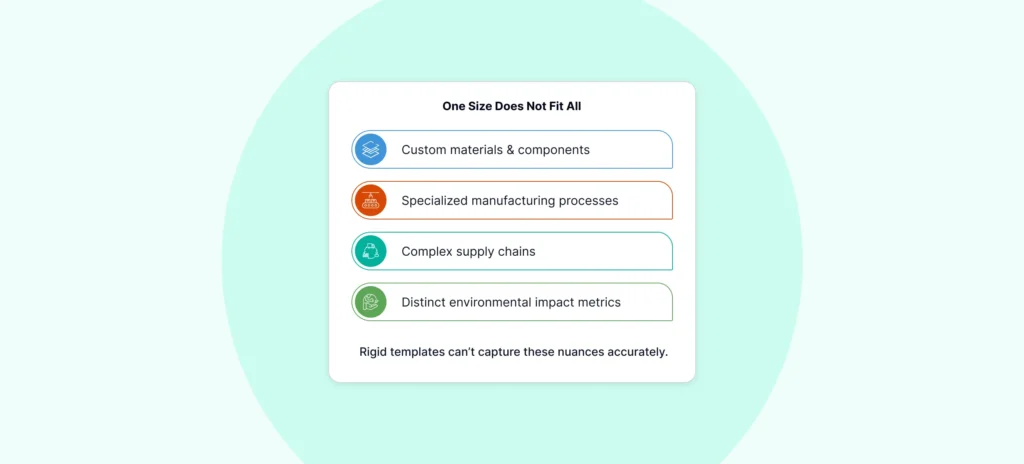Why One-Size-Fits-All Digital Product Passports Are Failing Manufacturers
Why One-Size-Fits-All Digital Product Passports Are Failing Manufacturers
As the European Union accelerates its transition toward a circular and climate-neutral economy, Digital Product Passports (DPPs) are becoming essential tools for ensuring compliance, transparency, and sustainability across product lifecycles. However, not all DPP solutions are created equal. Many manufacturers adopting off-the-shelf or rigid DPP templates quickly discover their limitations—often at the cost of data accuracy, operational efficiency, and regulatory readiness.

The Pitfalls of Generic Templates
At first glance, industry-standard DPP templates seem like a practical shortcut. They offer a predefined structure that simplifies the early stages of data collection. Yet, these templates frequently fall short in capturing the unique attributes of a manufacturer’s specific product or production process.
The result is often incomplete data entry, where important product characteristics—such as custom components, specialised materials, or intricate supply chain details—are either left out or forced into ill-fitting fields. This misalignment not only risks distorting the digital record of the product but also undermines the value of the passport itself.
Moreover, working around these limitations consumes time and effort. Teams find themselves wasting hours adapting their data to the structure of the template, instead of tailoring the DPP to reflect the realities of their products. In a regulatory landscape that is constantly evolving, these gaps can introduce significant compliance risks.
One Size Does Not Fit All

Every product is different. Even within the same sector, variations in materials, manufacturing techniques, supplier relationships, and environmental impact metrics can make each product’s data structure unique. A battery manufacturer may need detailed fields for carbon footprint calculations, while a furniture maker might prioritise traceability of sustainable wood sources.
Relying on a static DPP framework ignores this diversity and compromises the accuracy and completeness of the data. Manufacturers need systems that are as adaptable as the products they build—systems that can accommodate complexity without compromise.
The Need for Flexibility
The core challenge lies in standardisation versus customisation. While standardisation helps align industries and supports interoperability, too much rigidity can become counterproductive. The most effective DPP systems strike a balance by offering both a structured starting point and the flexibility to customise as needed.
DigiProd Pass addresses this challenge with a platform designed from the ground up to be customisable. Rather than forcing data into a predefined mould, it empowers manufacturers to design templates that fit their exact product requirements. The result is a DPP that genuinely reflects the product’s identity—accurate, complete, and regulation-ready.
Looking Ahead
Digital Product Passports are more than just compliance tools—they’re strategic assets in the race toward circularity and sustainability. But to unlock their full value, manufacturers must move beyond generic solutions and embrace platforms that allow them to tailor their approach.
The future of DPPs isn’t in rigid templates. It lies in intelligent, adaptable systems that recognise and reflect the uniqueness of every product. Manufacturers who make this shift will not only ensure compliance but also gain a competitive advantage through data-driven insights, streamlined processes, and trusted transparency.
Related News
Follow us
As the European Union accelerates its transition toward a circular and climate-neutral economy, Digital Product Passports (DPPs) are becoming essential tools for ensuring compliance, transparency, and sustainability across product lifecycles. However, not all DPP solutions are created equal. Many manufacturers adopting off-the-shelf or rigid DPP templates quickly discover their limitations—often at the cost of data accuracy, operational efficiency, and regulatory readiness.

The Pitfalls of Generic Templates
At first glance, industry-standard DPP templates seem like a practical shortcut. They offer a predefined structure that simplifies the early stages of data collection. Yet, these templates frequently fall short in capturing the unique attributes of a manufacturer’s specific product or production process.
The result is often incomplete data entry, where important product characteristics—such as custom components, specialised materials, or intricate supply chain details—are either left out or forced into ill-fitting fields. This misalignment not only risks distorting the digital record of the product but also undermines the value of the passport itself.
Moreover, working around these limitations consumes time and effort. Teams find themselves wasting hours adapting their data to the structure of the template, instead of tailoring the DPP to reflect the realities of their products. In a regulatory landscape that is constantly evolving, these gaps can introduce significant compliance risks.
One Size Does Not Fit All

Every product is different. Even within the same sector, variations in materials, manufacturing techniques, supplier relationships, and environmental impact metrics can make each product’s data structure unique. A battery manufacturer may need detailed fields for carbon footprint calculations, while a furniture maker might prioritise traceability of sustainable wood sources.
Relying on a static DPP framework ignores this diversity and compromises the accuracy and completeness of the data. Manufacturers need systems that are as adaptable as the products they build—systems that can accommodate complexity without compromise.
The Need for Flexibility
The core challenge lies in standardisation versus customisation. While standardisation helps align industries and supports interoperability, too much rigidity can become counterproductive. The most effective DPP systems strike a balance by offering both a structured starting point and the flexibility to customise as needed.
DigiProd Pass addresses this challenge with a platform designed from the ground up to be customisable. Rather than forcing data into a predefined mould, it empowers manufacturers to design templates that fit their exact product requirements. The result is a DPP that genuinely reflects the product’s identity—accurate, complete, and regulation-ready.
Looking Ahead
Digital Product Passports are more than just compliance tools—they’re strategic assets in the race toward circularity and sustainability. But to unlock their full value, manufacturers must move beyond generic solutions and embrace platforms that allow them to tailor their approach.
The future of DPPs isn’t in rigid templates. It lies in intelligent, adaptable systems that recognise and reflect the uniqueness of every product. Manufacturers who make this shift will not only ensure compliance but also gain a competitive advantage through data-driven insights, streamlined processes, and trusted transparency.
Related News
All Catagories
Follow us



